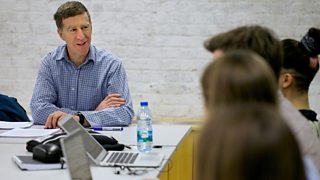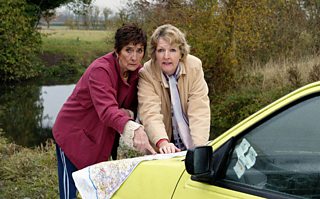Three Steps to Script-Editing Success
Philip Shelley
Script Editor, Consultant and Producer
Tagged with:
I’ve worked extensively as a script editor, both in production and development. Rather than going into the nuts and bolts of what a script editor does, here are some thoughts about the qualities you need to make it as a script editor.
As a script editor, your currency is based on several factors:-

Philip Shelley leading a masterclass
1. An understanding and appreciation of the craft of story-telling and screenwriting.
As script editors, we need to be interested to the point of being obsessed about STORY, how it works, and thinking about what it is that makes the good stories good.
In my experience most meetings with writers start off with the foreplay of discussing what you’ve been watching on TV the previous evening, what you’ve seen recently at the cinema, the theatre, or on Netflix. This often leads to bonding over how wonderful / horrible the latest TV show is, and why – before getting down to consummating your relationship with the negotiation of script notes (OK, that’s enough of the sex analogy).
You’ll find that one of the things nearly all of the most successful TV dramatists have in common is a voracious viewing appetite. Quite a few writers and script editors will pride themselves on watching all new TV drama (or at least the first episode). As the range of TV drama on offer increases almost monthly, this gets harder and harder. But everything you watch will teach you something and make you think about how story-telling works at its best.
We need to be watching everything – on TV but also on other platforms and in other media – theatre, film, online, documentaries (so many of the best documentaries use similar narrative tricks and techniques to the best drama, and there is so much to be learnt by fiction story-tellers from documentary film-makers – and vice versa), short films, novels, news stories.
Are script editors also screenwriters? Sometimes - but very often not. Some of the best script editors I know have no pretensions to be able to write themselves. BUT I do think it’s really valuable for script editors to try writing – even if it’s only to experience first-hand the exquisite pain of someone carelessly but accurately ripping your script (metaphorically) to shreds in front of you. The experience will be embedded in your psyche and will teach you to treat the writers with whom you work with respect and sensitivity – writers are brave!

June Brown and Penelope Keith in Margery and Gladys, Produced by Philip Shelley
2. Ideas
Story ideas are a major part of a script editor’s currency – whether you’re working on a long-running series, or in development.
The producers you’re working for will be constantly looking to you for a never-ending stream of cutting-edge, sellable stories. So script editors need to think like writers in the way they generate ideas. As script editors, we need to be constantly looking outwards at all of the extraordinary, amazing, horrifying things that are happening around us – this is where stories come from (not from sitting staring at your computer screen!). We need to be people-watching and stealing / borrowing ideas from wherever we can find them – and taking these ideas to writers and producers.

Waking the Dead, TREVOR EVE as Boyd ,HOLLY AIRD as Frankie, SUE JOHNSTON as Grace, CLAIRE GOOSE as Mel and WIL JOHNSON as Spencer (Script Editor: Philip Shelley)
3. Relationships with and Knowledge of WRITERS
But we should also be open to listening to ideas from writers. What a producer / production will often be looking for from you is a knowledge of the writers out there. Contrary to how it may appear to those on the outside, one of the main parts of a script editor’s job is sourcing new talent – discovering exciting new writing voices and bringing them into the industry and into paid writing work.
So it’s absolutely vital as script editors that we keep our ears to the ground, go to as much new writing theatre as possible, watch short films and constantly read scripts. As well as what we learn about the craft from reading scripts, the process of seeking out new writing talent should be a never-ending part of your job. You will stand and fall as a script editor on the quality of your database of the available screenwriting talent. So – you need to be very dedicated to reading, reading, reading; and you also need to be organised (keeping lists of writers) and pro-active. Not only do you need to constantly read, it’s also about the relationships you form with writers.
Part of this is also down to your relationships with literary agents. Literary agents are a key source of new writing talent – and you need to work through the process of discovering which agents you rate and which you don’t. OR, more particularly, the agents with whose taste you most concur (at the end of the day the whole process of assessing the quality of a script is ultimately subjective!)
Script-editing (indeed the TV drama business as a whole) is a very social and sociable business (despite the many hours you must spend reading by yourself!) We all – writers, script editors, producers – want to work with people with whom we get on. Because, as a script editor, when you work with a writer it can often be intense and demanding. You spend a lot of time talking to your writer and, through the stories you weave together, often get to know people very well, very quickly. We all prefer to do this if it’s with people we like and whose company we enjoy. Obvious really but, as a prominent literary agent put it eloquently to our 12 Channel 4 screenwriting writers on our weekend two weeks ago, ‘Don’t be an arsehole’!

Philip Shelley with students of the Singapore Media Academy
PHILIP SHELLEY runs the script consultancy and initiated and runs the annual (4Screenwriting, part of 4Talent, now in its 7th year).
He has worked as script editor and producer for many companies including the 主播大秀, ITV, and several indies. He has taught sessions in screenwriting and script-editing for, among many others, the Indie Training Fund, Northern Ireland Screen, Screen-Training Ireland, Bath Spa University and 主播大秀 Media Action in Cambodia.
His new venture is a series of dramatic monologue podcasts by new writers
